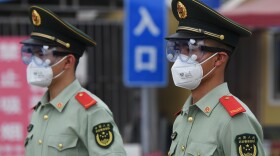Amy Cheng
-
The idea is to reduce the risk of spread of viruses through animal-human contact. Bamboo rat breeders are devastated by the loss of income. And critics say the ban has too many loopholes.
-
Meet some of the people in China who lived through the start of the coronavirus pandemic. They have not forgotten the weeks of isolation, fear and heartbreak.
-
Officials have discovered 79 symptomatic cases of the coronavirus linked to the Xinfadi food market, prompting a return to partial lockdown measures and fears of a second wave of infections.
-
The Chinese capital closed some markets, locked down parts of the city and banned outsiders from some neighborhoods after finding links between a massive wholesale market and a spate of new cases.
-
Measures to mitigate the coronavirus pandemic have devastated China's economy, shutting factories and urban jobs that millions of migrant workers depend upon. Many now seek jobs in their villages.
-
China's diplomacy has taken a strikingly "undiplomatic" turn, analysts say, as it counters U.S. accusations of starting the coronavirus.
-
After a 76-day lockdown, the city's reopening includes the return of its tradition of eating a medley of morning snacks.
-
The end of the city's 76-day lockdown is a milestone in China's efforts to contain the outbreak of the coronavirus that sickened more than 80,000 across the country and overwhelmed health systems.
-
As restrictions are relaxed in parts of China where the coronavirus struck, residents in Beijing are cautiously returning to the public spaces they love.
-
The 83-year-old, weightlifting pulmonologist is widely seen as a source of reliable information — although one recent comment seems to have been politicized by the government.
-
NPR interviewed four residents of Wuhan who contracted the virus, recovered — but then had a retest that turned positive. What does that mean for China's recovery from COVID-19?
-
Li Wenliang's warnings about the virus initially got him reprimanded by authorities in Wuhan. Now, six weeks after he died of COVID-19, Chinese investigators say they should have acted differently.











